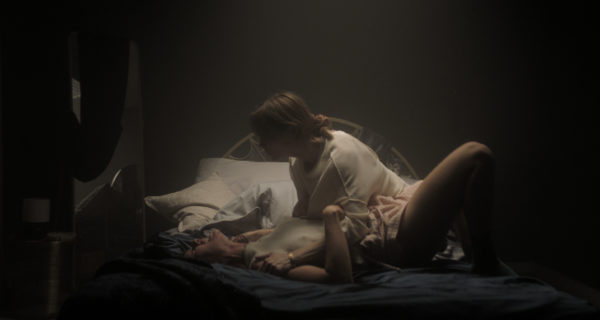
Ruth Paxton has created a domestic nightmare based around grating sensory experiences.
A Banquet delights in highlighting every excruciating fork scraping across a plate, as well as close up shots of characters’ mouths as they eat. The film truly makes food and consumption disgusting, so much so that it’s easy to relate to teenager Betsey (Jessica Alexander) when she suddenly stops eating.
The first half of the film is a carefully calibrated consideration of grief, inefficient coping mechanisms and lack of communication. A Banquet opens as Holly (Resident Evil: Apocalypse’s Sienna Guillory)’s sick husband dies by suicide right in front of her. Months later, the family is still mired in grief, but there’s a discomforting lack of discussion about what they have been through.
Instead it’s business as usual – Holly coordinates trips to the dentist, attends younger daughter Lizzie (Ruby Stokes)’ figure skating practice and resignedly speaks with her stern mother, June (Lindsay Duncan). There’s a clear love and affection between Holly and her daughters, but it’s also evident that they’re each struggling in their own way (Guillory, in particular, does great work as the emotionally exhausted mother who appears strong on the surface, but falls apart when she’s by herself).
Everything changes when Betsey breaks away from a house party – and boyfriend Dominic (Kaine Zajaz) – to follow a blood red moon into the woods. She returns, hours later, in a dazed and disoriented state, unable to discuss what has happened. From this moment on, Betsey refuses to eat.
No more meals. Not even a snack. For the rest of the film, not even a pea will cross her lips.
A Banquet has two stand-out sequences and they both take place at the dinner table. The first occurs a short while after Betsey has begun her fast. Holly, sitting at the centre of the table, brusquely takes Betsey’s plate and, with methodical deliberateness, scrapes off all of the food except five peas (highlighted in extreme close-up). When Betsey refuses even this small amount, Holly administers the same process until only a single pea remains, berating her daughter to eat just one. As Betsey tearfully punctures the green globe with her fork (each action punctuated by an amplified sound design), it’s clear that this will end in disaster.
It is only in the aftermath that one registers how tense, exhausting and confronting the scene is (ditto its spiritual sequel later in the film). That so much conflict, drama and power can be rung from a simple dinner sequence is a testament to Paxton’s framing, the exquisite sound design and A Banquet’s two lead performances.
Sadly the latter third of this dynamic is diluted when the film jumps forward six months at the halfway point and Betsey spends the rest of the film barely conscious and confined to her bed. She’s not starving per se – following the second dinner scene, Holly monitors her eldest daughter’s weight twice a day – but Betsey is succumbing to whatever happened to her in the woods. As her strength and dialogue ebbs, so too does the mother/daughter conflict.
This leaves the door open for a new iteration. As Betsey retreats to her quiet corner of the gorgeous family home, Lizzie rapidly matures as she witnesses a new tragedy in real time. Then there’s Holly’s own challenging mother/daughter relationship with June. Here Paxton explores a different, albeit complementary, family dynamic narrative by bringing in Duncan’s fiery, controlling character to explore how generational trauma has contributed to Holly’s parenting style.
Alas none of this is quite as compelling. A Banquet is never bad (the house porn continues, as does the unbearable sound design and exquisite framing), but the film undeniably loses something when Betsey becomes a supporting character. The energy in the film deflates when the time jump occurs and the conflict between Holly and June is never as engaging, despite good work from both actresses. Perhaps it’s the ennui of having to watch yet another family member slowly waste away (the shadow of the father’s death in the opening looms large in the back half), but the pacing feels glacial, the arguments repetitive and the end drawn-out, despite its inevitability.
There’s an attempt to infuse an emotional catharsis into the film’s final moments, when it’s just Holly and Betsey once again and Betsey’s prophecy is clearly nearing its end, but it’s too little, too late. Even a striking closing image (reminiscent of another recent UK female-written and directed horror feature debut) can’t quite compensate for the lethargic back half.
It’s a shame because the first half of A Banquet is so visually captivating and technically well-crafted. If only the back half didn’t knock the wind out of its sails, the film would be a new modern classic. As it is, it’s only halfway there.
3/5
A Banquet has been picked up by IFC Midnight